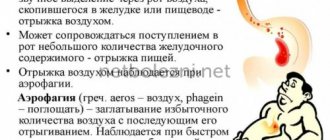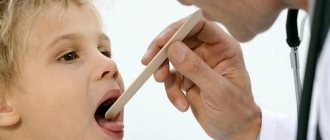Belching rotten eggs in a child indicates that pathological changes in the functioning of the organs of the digestive system are developing in the child’s body. There are several factors that contribute to the occurrence of such unpleasant symptoms, but the main ones are individual intolerance to certain foods, the pathological influence of intestinal bacteria and the course of certain gastrointestinal diseases.
- Etiology
- Symptoms
- Diagnostics
- Treatment
- Prevention and prognosis
Despite the fact that such a sign in itself is a symptom of a particular pathology, it may be accompanied by other manifestations. For example, attacks of nausea and vomiting, increased body temperature, profuse diarrhea and aversion to food.
Due to the fact that such manifestations accompany many diseases of the digestive system and gastrointestinal tract, it is prohibited to eliminate them independently. Differential diagnosis and treatment can only be prescribed by a gastroenterologist or infectious disease specialist. Depending on the reasons for the appearance of this symptom in children, its elimination will be carried out by conservative or surgical methods, as well as by following a gentle diet and using traditional medicine recipes.
Causes of burping in children of different ages
Belching in children of different ages can occur for various reasons. It is not always a symptom of a pathology; you should consult a doctor if, in addition to it, the child has the following symptoms:
- weight loss;
- vomiting with bile;
- pain when belching;
- severe vomiting;
- cough.
Infants under 1 year
After the birth of a child, during the first 6-7 months, regurgitation is considered normal and indicates the normal functioning of the body. But by 8 months, a healthy child experiences belching less and less often.
Regurgitation after eating occurs for the following reasons:
- The baby was overfed.
- The child was suddenly picked up after eating, played with, or placed on his stomach. Due to the fact that the baby was in a horizontal position during feeding, and was abruptly transferred to a vertical position, as a result, the sphincters of the digestive tract do not have time to close and belching appears.
- The baby has digestive problems.
- The formula is not suitable for the child.
- Incorrect attachment of the baby to the breast during feeding, due to which gases accumulate in the intestines and do not pass away naturally.
- Intestinal obstruction. This is a pathological condition that requires emergency care. It is characterized by belching green or brown food.
- Infectious diseases in which the child regurgitates undigested food debris. In addition, the baby becomes capricious, his temperature rises, and his skin turns pale.
In addition, belching in a child under one year old may be due to incompletely formed sphincters and the nervous system.
Usually, the process of belching in children of the first year of life is considered the norm, during which the child’s stomach is freed from excess food, air comes out, having entered the baby’s body with food or strong crying, and intestinal motility is normalized.
But if belching is frequent, then it irritates the mucous membrane of the esophagus and negatively affects the condition of the oral cavity. To prevent this, you must follow the following recommendations:
- 30 minutes before the next feeding, place the baby on his stomach;
- during feeding, you need to gently massage the belly in the navel area clockwise so that the air that enters the digestive tract leaves the body through the intestines;
- After feeding, the baby must be kept in an upright position for a quarter of an hour;
- Lightly stroking the child's back facilitates the passage of gases and air.
What does an unpleasant smell mean?
Belching rotten eggs indicates congestion in the digestive system. Normally, when food enters the body, the production of gastric juice is activated, which helps to quickly process it. Disinfected, digested food from the stomach enters the small intestine, where the main digestion processes take place. Then the food bolus is successfully evacuated through the colon and then the rectum.
What happens when the functioning of the digestive tract organs is disrupted? Food stagnates. Gradually, fermentation of products begins, hydrogen sulfide and other harmful substances are released into the body. All this is accompanied by symptoms such as putrid breath, discomfort, stomach pain, and belching of rotten eggs. Sometimes nausea, vomiting, and stool upset may occur.
Children from 1 to 2 years
Belching in children over 12 months of age is due to the fact that new foods are introduced into the child’s diet, such as vegetables, fruits, berries, and sometimes sweets. But not all new food can be digested, which is manifested by belching and abdominal pain.
In order for the child’s body to get used to new foods faster, new foods should be introduced gradually. If a negative reaction is observed when introducing a new product into the diet, then you should temporarily stop using it until the necessary enzymes begin to be produced in the digestive tract.
Another reason for burping is the baby’s excessive mobility, especially when he starts moving after feeding.
It happens that it appears due to problems with the digestive and respiratory systems.
Symptoms
Despite the fact that belching rotten eggs is in itself a sign of a particular disorder, it may be accompanied by symptoms of the pathology that caused the appearance of this symptom. These include:
- diarrhea;
- increased gas formation;
- pain syndrome;
- intestinal colic;
- dizziness;
- increase in temperature indicators;
- severe weakness;
- nausea, which often ends with vomiting;
- heartburn;
- feeling of heaviness in the stomach;
- loss of appetite or complete aversion to food - this is due to the fact that most signs of gastrointestinal diseases begin to manifest themselves intensively after a meal.
Children from 2 to 5 years old
Many children aged 2-3 years begin to go to kindergarten.
During adaptation, the child may cry frequently, which causes muscle spasms, narrowing of the lumen between the esophagus and stomach, which causes belching. Gradually he calms down and the unpleasant symptom goes away. In addition, many children in the kindergarten often begin to get sick. Due to a cold, breathing is impaired, which causes compression of the muscles of the esophagus.
One of the provoking factors for belching is allergies. In addition, it can be caused by the following pathologies:
- helminthiases;
- inflammation of the pancreas and gallbladder;
- gastritis;
- scoliosis;
- neurosis;
- hepatitis;
- disturbance of intestinal microflora;
- hiatal hernia;
- pathologies of the locomotor system;
- diseases of the teeth and oral cavity;
- ENT infections, including chronic tonsillitis;
- cough of various origins;
- nasal congestion;
- enlarged tonsils;
- pathologies of the nervous system;
- gastroparesis;
- neoplasm of malignant and benign origin.
There may also be non-pathological causes of belching, such as:
Etiology
The main factor in the occurrence of regurgitation with an unpleasant smell of rotten eggs is considered to be hydrogen sulfide, a gas found in protein foods. In children, the appearance of this symptom is caused by the immaturity of the organs, as well as functional disorders of the gastrointestinal tract.
A wide variety of predisposing factors are connected by one feature - they are all associated with the development of the process of decay, which can develop against the background of various pathologies.
The main sources of rotten egg belching in children are:
- reduced concentration of hydrochloric acid, which can be caused by gastritis of any nature;
- the course of inflammation of the pancreas;
- pathological influence of pathogenic microorganisms;
- allergic reaction to any food ingredient;
- Crohn's disease;
- cholecystocholangitis;
- presence of intestinal infections;
- duodenitis and enteritis;
- violation of bile secretion;
- ulcerative lesions of the stomach or duodenum;
- reflux or bulbitis;
- hiatal hernia;
- motor dysfunction of the stomach.
A stomach or duodenal ulcer is a possible cause of belching rotten eggs
Such disorders can become not only the root causes, but also complications.
Predisposing factors include:
- prolonged exposure to stressful situations and emotional turmoil;
- frequent overeating;
- consumption of food that is not appropriate for the child’s age;
- the predominance in the diet of fatty, salty, sweet and spicy foods, as well as carbonated drinks.
The pathogenesis of this symptom is the involuntary release of gases from the oral cavity, which is facilitated by an increase in intragastric tone when swallowing air during meals, quickly absorbing dishes and talking during meals.
List of ingredients that can cause such an undesirable symptom:
- preservatives;
- fast food;
- whole milk;
- strong tea;
- nuts and seeds;
- eggs in any form;
- bananas;
- legumes;
- red meats.
Cases have been recorded in which belching of rotten eggs was observed in female representatives during pregnancy and was transmitted to the newborn baby. Gastroenterologists associate this process with congenital disorders of bile secretion.
Hiccups and belching
Hiccups are provoked by spasms of the diaphragm and appear due to hypothermia, fear, or anxiety. An involuntary breath is accompanied by a sound. Regurgitation is characteristic of dysfunction of the digestive system and usually occurs due to overeating.
When hiccups and belching appear together, this may be due to the fact that the child has not drunk enough water or has eaten too much. But if they appear frequently, then you need to consult a doctor, as they may be symptoms of some pathologies, including diseases of the cardiovascular system.
Prevention and prognosis
There are no specific preventive measures against the appearance of such a symptom. You just need to follow the recommendations regarding nutrition and undergo regular examinations with a pediatrician and gastroenterologist.
Often, burping rotten eggs does not pose a threat to the child's life. However, the prognosis directly depends on the pathology that caused the appearance of such an unpleasant symptom.
If this is due to overeating or poor diet, then the prognosis is favorable. In situations where this is caused by gastrointestinal diseases or other disorders, the prognosis depends on timely diagnosis and treatment.
Belching and fever
High fever and belching can be a symptom of pathologies of the digestive tract, such as gastritis, enteritis and colitis. These two signs may indicate poisoning. Often with these pathologies, in addition to fever and belching, nausea, vomiting and diarrhea are observed.
In case of poisoning, antipyretics and enterosorbents are recommended for a child.
To treat inflammation of the digestive tract mucosa, diet, antibiotic therapy, probiotics and enzyme preparations are recommended.
They can also accompany infectious diseases, including those caused by rotaviruses, Proteus, and Shigella. With dysentery, in addition to belching and fever, the child has frequent stools, in which blood and mucus can be replaced, and he is bothered by pain during bowel movements.
With Proteus infection, the stool is watery, yellow-green, and has an unpleasant odor.
But in any case, when belching is accompanied by a high temperature, you should consult a doctor.
Treatment
Methods for eliminating unpleasant symptoms directly depend on the sources of their occurrence. Several methods are used during treatment:
- taking medications;
- diet therapy;
- use of traditional medicine recipes;
- surgical intervention.
Drug treatment will differ depending on what disease caused the belching:
- for functional disorders of the gastrointestinal tract and intestinal infections, antibiotics and probiotics, prebiotics and prokinetics, painkillers, antiemetics and other drugs are prescribed to neutralize symptoms;
- for gastritis - medicinal substances that are aimed at normalizing the level of hydrochloric acid and other medications depending on the symptoms;
- for ulcerative lesions of the duodenum or stomach - antibacterial drugs, antacids and vitamin complexes;
- for cholecystocholangitis - vitamins, choleretic and enzyme substances, as well as antibiotics.
It follows that drug treatment is individual for each patient.
After a final diagnosis has been established, patients are advised to follow dietary table No. 1 or 5. All recommendations, a list of permitted and prohibited foods or recipes are prescribed only by the attending physician.
Good results can be achieved by using traditional medicine recipes. In no case should they be used as the only method of treating a particular pathology, or without consultation with clinicians.
Surgical intervention is extremely rarely resorted to, often when conservative treatment methods are ineffective.
Sour belching in a child
If a child has sour belching, then you need to show him to the doctor to find out what caused it. When it appears immediately after eating, it indicates incomplete closure of the sphincter that separates the esophagus from the stomach.
When belching appears 30-40 minutes after eating, this may indicate an enzymatic deficiency. Enzymes cannot completely digest food, which causes fermentation and gases. Such symptoms are characteristic of pancreatitis.
When sour belching appears 2-3 hours after eating, it is most likely associated with gastritis with high acidity. It may also be associated with inflammation of the duodenal bulb.
Sour belching can be caused by diseases of the oral cavity, intestinal dysbiosis, overeating, snacking on the go, or eating dry food.
We recommend watching the following video:
Possible causes of burping rotten eggs
Why does this pathology occur? The reasons can be very different - from banal overeating to diseases of the gastrointestinal tract (gastrointestinal tract). Let's look at the most harmless ones:
- Poor nutrition. The digestive system in children is immature. The stomach of a child 2 years old and younger is not yet able to digest fatty, heavy foods. It stagnates and begins to ferment. As a result, the baby belches with the smell of rotten eggs.
- Intolerance to certain foods. If a putrid odor appears in a baby during breastfeeding, this may indicate lactase deficiency - the inability to digest milk. As a rule, with this diagnosis, the baby has severe stomach pain, suffers from colic, and the baby has difficulty gaining weight. In this case, he is transferred to a lactose-free adapted mixture or given drugs with missing enzymes. Fructose intolerance is also common (it is found in vegetables, fruits, sweet juices, and legumes).
- Poisoning from spoiled food. Burping rotten eggs can be a symptom of food poisoning. This happens especially often in the summer, when the heat significantly increases the risk of buying an already spoiled product.
If burping rotten eggs occurs due to dietary errors, no special treatment will be required. With timely measures taken, it will be enough to remove harmful substances with the help of a sorbent, as well as limit the child’s consumption of foods that cause fermentation.
Belching as a sign of gastrointestinal disease
It is worth understanding that a putrid odor when belching, especially against the background of other symptoms, may be a sign of a disease of the digestive tract. What diseases do rotten burps usually indicate:
intestinal infection;- pancreatitis;
- stenosis of the stomach, intestines;
- helminthic infestation;
- biliary dyskinesia;
- gastritis with low acidity;
- gastroesophageal reflux disease;
- duodenogastric reflux;
- hiatal hernia;
- peptic ulcer of the stomach or duodenum;
- cholecystitis;
- cholelithiasis;
- decreased motor function of the intestines or stomach;
- jaundice (viral hepatitis A);
- diabetes.
If a child's belching is accompanied by severe abdominal pain, diarrhea, fever or other alarming symptoms, then you should immediately show him to a doctor. It is also worth consulting a specialist if regurgitation of rotten eggs is observed regularly.
Rotten burps and diarrhea
The intestines and stomach are links in one big chain. The disruption of one organ triggers a chain reaction. That is why a child burps a rotten egg and has frequent diarrhea at the same time. In this case, it is important to pay attention to the nature of the feces.
If there is mucus, blood, or green color in the stool, this may indicate an intestinal infection.
Symptoms such as vomiting, weakness, and elevated body temperature should not be ignored. Remember that children 2 years of age and younger are at risk of severe dehydration if they have diarrhea.
Belching with a vomitous smell in an infant
Until about 6 months of age, your baby may periodically burp and smell like vomit. This usually happens after feeding, when the baby is actively moving, or if he is immediately placed on his stomach. In this case, the following happens: air bubbles come out, and along with them, food particles are thrown into the oral cavity.
To prevent burping with the smell of vomit in an infant, you should feed him in a calm environment, monitoring the correct latch on the nipple. After this, the baby should be held in a “column” for 5 minutes, and then put to rest on his side. If these measures do not help, then the child should be checked for neurological abnormalities.
Belching and gases in a child
Belching and gas can occur in children of any age. These signs may be associated with consuming large amounts of fiber, and to eliminate them, it is enough to exclude from the diet foods that provoke gas formation, such as legumes, cabbage, apples, pears, peaches, and carbonated drinks.
Also, belching and bloating may be associated with insufficient production of enzymes, which requires consultation with a doctor. You need to show your child to a doctor if gases cause pain.
Is it possible to help a child cope with burping and reflux?
There are two things to pay attention to: how you feed your baby and what exactly.
1. What to feed:
If you have started complementary feeding with baby food, pay attention to the portions. Small portions are digested faster, and smaller amounts of food reduce the likelihood of heartburn. It is worth consulting with your pediatrician which mixture is suitable for your child; it is possible that the doctor will recommend anti-reflux mixtures. It is worth remembering that the prescription of anti-reflux mixtures should be preceded by identifying the causes of regurgitation, so the mother needs to be very attentive to her child.1
2. How to feed:
- Feed your baby slowly and try to hold him at a 45-60 degree angle, which helps prevent reflux
- Let your baby release excess air while feeding
- Do not feed your baby just before bedtime, and do not put your baby in the crib immediately after feeding2
- Make sure the diaper or wrap is not too tight for the baby
Treatment with medications
Before prescribing treatment, you need to determine what caused the belching. The following tests can help make a diagnosis:
- general analysis of urine and feces;
- blood biochemistry;
- respiratory tract examination;
- FGDS;
- pH-metry;
- Ultrasound of the abdominal cavity;
- colonoscopy;
- computer and magnetic resonance therapy;
- gastrobiopsy.
After the child has been examined and the cause of the belching has been determined, the doctor will, if necessary, select an individual treatment plan.
With increased acidity, children from birth can take Phosphalugel, which is available in a gel for oral administration. It can be given when belching is associated with the following pathologies:
- gastrointestinal ulcer;
- gastritis with normal or high acidity;
- GREB;
- diaphragmatic hernia.
Phosphalugel should not be given to a child if he has been diagnosed with kidney dysfunction and intolerance to the composition of the medication. It should be taken with caution in case of liver cirrhosis and heart failure.
Taking Phosphalugel can cause constipation.
In case of increased gas formation, Espumisan is recommended, which can be taken in the form of an emulsion and drops from birth, and in capsules it is allowed from 6 years. The drug is contraindicated in case of allergies to its composition or intestinal obstruction. Drops and emulsion are prohibited if you are intolerant to fruit sugar.
From birth, with increased gas formation, you can take Smecta, which has an adsorbing effect. The drug binds viruses, bacteria and toxins on its surface.
Smecta should not be taken if there is intestinal obstruction or if its composition is tolerated. It should be given with caution to a child who has frequent constipation. Taking Smecta may cause allergies, bloating, constipation, and vomiting.
The following drugs can restore intestinal microflora:
- Hilak forte. The medicine is available in drops, which are contraindicated in case of allergies to their composition, impaired absorption of glucose and galactose, lactose intolerance, lactase and isomaltase deficiency. The medication may cause allergies, stomach upset, and constipation. Hilak Forte has no age restrictions; it can be given before or after meals. The drops should be diluted with a small amount of liquid, but not with milk.
- Bifiform. The drug is available in capsules, which can be used for intestinal dysbiosis and indigestion of various origins. Bifiform should not be taken if you are intolerant to its composition, in which case it can cause allergies.
For pancreatitis and other pathologies, when enzyme deficiency is observed, enzymes, for example, Creon, can be prescribed. The medicine is available in capsules that contain microspheres. It has no age restrictions. Creon should not be given if you are intolerant of its active and auxiliary components.
The medication may cause the following adverse reactions:
- abdominal pain, nausea, vomiting, indigestion, constipation, flatulence;
- stenosis of the ileum, cecum and colon;
- allergy, which manifests itself as itching, urticaria, anaphylaxis.
If the child is overly excitable, you can give valerian and motherwort.
If belching occurs with the smell of rotten eggs, diet, exercise, and taking enzyme preparations are recommended. To remove decomposition products, you can give your child adsorbents, for example, Polysorb MP.
Recommended video:
It is produced in powder from which a suspension is prepared; it is contraindicated in case of exacerbation of peptic ulcer, bleeding from the digestive tract, intestinal atony, hypersensitivity to the composition of the medication.
Polysorb MP can cause allergies, constipation, dyspeptic disorders, and impaired absorption of vitamins and calcium. Sometimes belching that smells like hydrogen sulfide may require surgery.
Diagnostics
A symptom such as belching with the smell of rotten eggs in a child requires immediate seeking help from specialists, since it always indicates a disruption in the functioning of the gastrointestinal tract.
The main goal of diagnosis is to find the main factor contributing to the appearance of such a symptom. First of all, the gastroenterologist needs to familiarize himself with the medical history and life history of not only the little patient, but also his immediate family, after which a thorough examination and questioning takes place. This will make it possible to find out not only the first time of appearance of such an unpleasant symptom, but also to determine whether it is accompanied by other signs.
Establishing the source of such belching in children is a complex process, because gastrointestinal pathologies may not always be the cause. A mandatory stage of diagnosis is laboratory tests:
- general and biochemical blood tests - to identify inflammatory changes;
- urine test - to confirm or refute the presence of liver or gallbladder diseases;
- specific tests to identify different groups of parasites;
- microscopic examination of feces.
Instrumental diagnostic methods include:
- endoscopy, during which the mucous surfaces of the digestive system are assessed;
- biopsy – removal of a small piece of the affected organ for subsequent histological examination. This is necessary to distinguish the inflammatory process from oncology;
- radiography using a contrast agent;
- gastroscopy;
- Ultrasound, CT and MRI.
Gastroscopy
Thanks to such methods, it is possible to carry out differentiated diagnostics, which allows doctors to find out the main factor in the occurrence of rotten egg belching in children.










